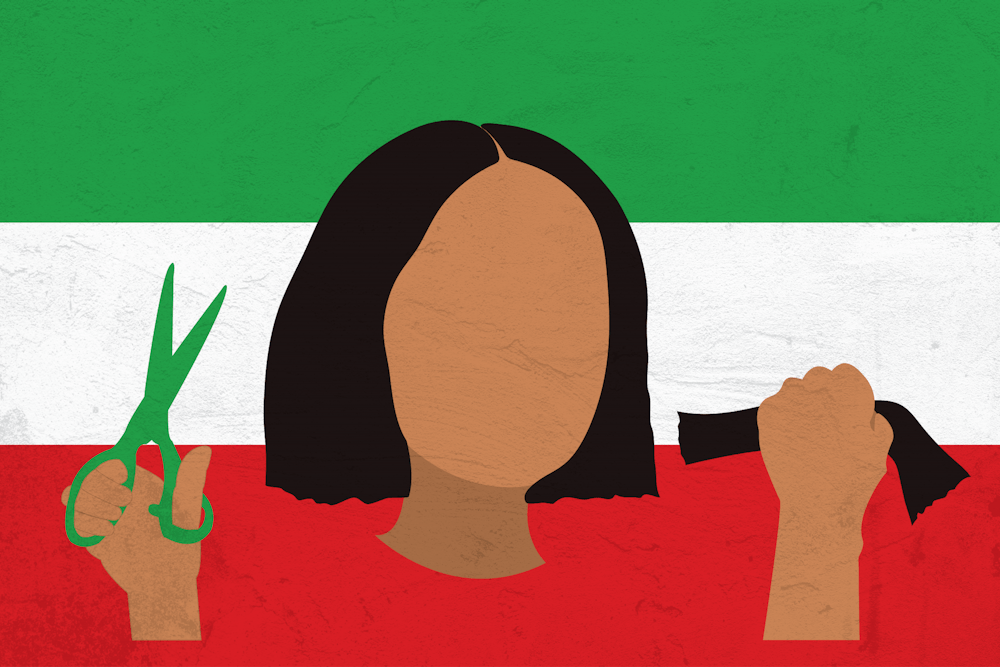When the protests in Iran started, Iranian students wanted the university to help spread awareness about the situation so that they could amplify the voices of those helpless from the regime, but, in that time of need, the university barely showed any support.
The protests in Iran sparked when Mahsa Amini was killed by the morality police for not wearing her hijab properly and wearing skinny jeans. The morality police are in charge of enforcing the strict Islamic dress code.
Since the start of the protests, over 500 protestors have been killed and close to 20,000 people have been arrested as of Jan. 15, 2023. In a show of support for Iranian women’s rights, the Iranian Student Organization held two protests on Greene Street on Sept. 21 and at the Statehouse on Oct. 4.
Multiple Iranian students emailed university President Michael Amiridis, Dean of the College of Engineering and Computing Hossein Haj-Hariri and Provost Donna Arnett asking them to show support for the students of Iran by sending out a mass email to all students and faculty acknowledging that women's rights are being violated in Iran and that there are resources on campus that can help them through this difficult time.
They asked the university to talk to senators for help with the crisis, according to the Iranian Student Association. Instead, Global Carolina and International Student Services sent emails to international students and only Iranian students, respectively, to show the university’s support.
"The university has not sent any campuswide communications, but our office of International Student Services continues to work students impacted," USC spokesperson Jeff Stensland said in a message to The Daily Gamecock.
Other schools, such as the University of Illinois Chicago, Carnegie Mellon University and Yale University, showed their support for their Iranian students by sending campus-wide emails and providing mental health resources for students seeking support. By doing this, the universities are spreading awareness of the crisis in Iran and letting everybody on their campus know what their stance is on the situation.
"Three years ago they shot down the internet and killed 1,500 people in three days because nobody could talk about them, nobody knew what was happening in Iran ... it was one of the darkest times of my life," second-year graduate student Elham, president of the Iranian Student Association of USC, said.“Being out of Iran gives us a voice to amplify the voice of Iranians, so they cannot kill them in silence and arrest them ... We want to grab the attention of the world, so they cannot do that again.”
As Iranian students and faculty, like mechanical engineering instructor Mostafa Mobli are watching the protests unravel in their country, they want to utilize any resources they have to spread awareness about the Iranian women’s rights protests. The university should have been more sympathetic towards the Iranian students' requests for sending a university-wide email, which would provide a wider outlet to get information about what is happening to Iran protesters.
"I understand the university doesn't really want to take a political stance, but at the same time, they did take a stance when the war on Ukraine happened," Mobli said. “There is no problem with the university being a little political when you have some sort of a moral compass. They know that what is happening in Iran is atrocious and that there are people getting killed, and no one wants that to happen. You don't have to be pro-regime or against the regime to be against people being murdered in the streets.”

Mostafa said the university asked the faculty to help support Ukrainian students when the war started in their country and sent an email about Ukraine to all students and faculty members, but it did not ask the faculty to support Iranian students when the protests started.
The university should remain consistent in its views and make sure that all the student’s voices are heard on campus instead of ignoring the requests made by students in a time of crisis.
"(Iranian students) are going through a difficult time, really difficult, and they're keeping up with their courses, but their mental health is the most important thing. Faculty members need to know about it, and the students need to be taken care of," a Ph.D. student, who wished to remain anonymous, said.
This is a difficult time for Iranian students who have to hear about the brutal acts happening in their home country while trying to stay afloat in their studies. The university should have eased the pressures faced by these students by making sure that faculty and staff are well aware of the crisis happening in Iran and able to support their students in a comforting way.
The university created this unnecessary double standard by not listening to the voices of their Iranian students in need of help. Now, it needs to be more proactive when it comes to providing support for its students and become an institution that students can rely on for help.
Editor's note: Elham's last name has been removed out of safety concerns.

